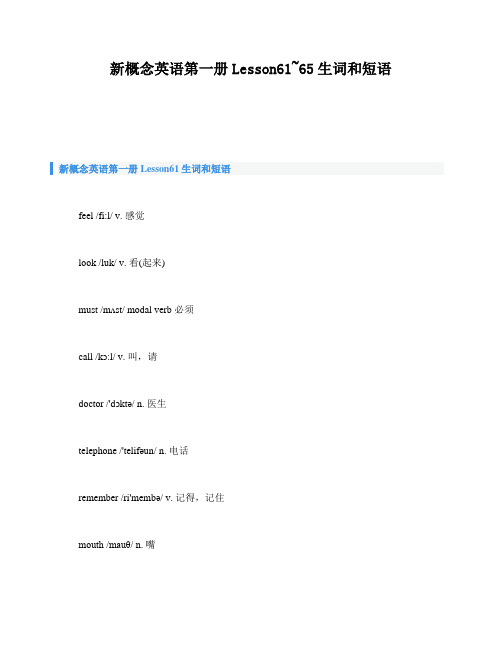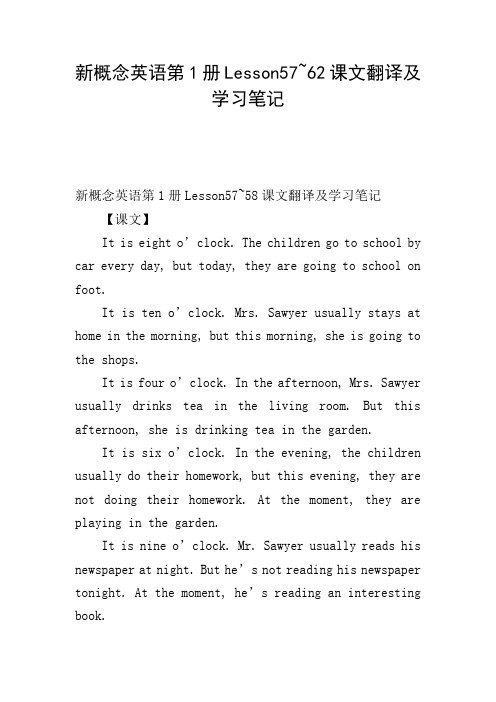新概念英语第一册lessen55-61课文及单词短语
新概念英语第一册Lesson61_65生词和短语

新概念英语第一册Lesson61~65生词和短语新概念英语第一册Lesson61生词和短语feel /fi:l/ v. 感觉look /luk/ v. 看(起来)must /mʌst/ modal verb 必须call /kɔ:l/ v. 叫,请doctor /'dɔktə/ n. 医生telephone /'telifəun/ n. 电话remember /ri'membə/ v. 记得,记住mouth /mauθ/ n. 嘴tongue /tʌŋ/ n. 舌头bad /bæd/ adj. 坏的,严重的cold /kəuld/ n. 感冒news /nju:z/ n. 消息新概念英语第一册Lesson62生词和短语headache /'hedeik/ n. 头痛aspirin /'æsprin/ n. 阿斯匹林earache /'Iəreik/ n. 耳痛toothache /'tu:θeik/ n. 牙痛dentist /'dentist/ n. 牙医stomach ache /'stʌmək-eik/ 胃痛medicine /'medisin/ n. 药temperature /'tempərətʃə/ n. 温度flu /flu:/ n. 流行性感冒measles /'mi:zəlz/ n. 麻疹mumps /mʌmps/ n. 腮腺炎新概念英语第一册Lesson63生词和短语better /'betə/ adj. 形容词well的比较级certainly /sə:tnli/ adv. 当然get up 起床yet /jet/ adv. 还,仍rich /ritʃ/ adj. 油腻的food /fu:d/ n. 食物remain /ri'mein/ v. 保持,继续新概念英语第一册Lesson64生词和短语play /plei/ v. 玩match /mætʃ/ n. 火柴talk /tɔ:k/ v. 谈话library /'laibrəri/ n. 图书馆drive /draiv/ v. 开车so /səu/ adv. 如此地quickly /'kwikli/ adv. 快地lean out of 身体探出break /breik/ v. 打破noise /nɔiz/ n. 喧闹声新概念英语第一册Lesson65生词和短语Dad /dæd/ n. 爸(儿语)key /ki:/ n. 钥匙baby /'beibi/ n. 婴儿hear /hiə/ v.听见enjoy /in'dʒɔi/ v. 玩得快活yourself /jɔ:self/ pron. 你自己ourselves /'auɔ'selvz/ pron. 我们自已mum /mʌm/ n. 妈妈。
新概念英语单词第一册第55课:索耶一家人.doc

新概念英语单词第一册第55 课:索耶一家人live [lv] v.住,生活【派生】 living生【充】 life生活alive活着的【搭配】 live on...靠⋯⋯生活【例句】A:Who lives with you?A:你和住在一起?B:Kate and Nancy do.B:我跟特和南希⋯起住。
stay [ste]停,逗留【充】 stop over中途停留【搭配】 stay at home待在家stay still 静止不stay out of不参与stay up熬夜【例句】A: How long do you plan to stay here?A:你打算在儿停留多久?B:I will stay here for about ten days.B:我将在儿待大概10 天。
home [hm] 家【派生】 homeland 祖国【单词搭配】 at home 在家 go home 回家【单词例句】A:I must go back home where many things are waitingfor me to settleB: We're very sorry to see you go.A:我必须回国了,很多事正等着我去处理。
B:您要走了,我们感到非常遗憾。
housework['hauswa :k] 家务【单词构造】 house(房子) +work(工作) = housework (家务)【单词搭配】 do the housework做家务【单词例句】A: My mother always says I spend too much timeon watching TVA:我妈妈总是说我把太多的时间花费在看电视上。
B: Then you should finish your homework, and thenhelp your parents with the housework some day.B:那你以后应该先完成家庭怍业,然后帮父母做些家务。
新概念英语第一册第55-56课-The Sawyer family

新概念英语第一册第55-56课:The SawyerfamilyLesson 55 The Sawyer family索耶一家人Listen to the tape then answer this question. When do the children do their homework?听录音,然后回答问题。
孩子们什么时候做功课? The Sawyers live at 87 King Street.索耶一家住在国王街87号。
In the morning, Mrs Sawyer goes to work and the children go to school.早上,索耶先生去上班,孩子们去上学。
Their father takes them to school every day.父亲每天送孩子们去上学。
Mrs Sawyer stays at home every day. She does the housework.索耶夫人每天呆在家里。
她料理家务。
She always eats her lunch at noon.她总是在正午吃午饭。
In the afternoon, she usually sees her friends. They often drink tea together.下午,她总是会见她的朋友。
她们经常在一起喝茶。
In the evening, the children come home from school. They arrive home early.傍晚,孩子们放学回家。
他们到家很早。
Mr Sawyer comes home from work. He arrives home late.索耶先生下班回家。
他到家很晚。
At night, the children always do their homework. Then they go to bed.晚上,孩子们总是做作业,然后去睡觉。
新概念英语第1册Lesson57~62课文翻译及学习笔记

新概念英语第1册Lesson57~62课文翻译及学习笔记新概念英语第1册Lesson57~58课文翻译及学习笔记【课文】It is eight o’clock. The children go to school by car every day, but today, they are going to school on foot.It is ten o’clock. Mrs. Sawyer usually stays at home in the morning, but this morning, she is going to the shops.It is four o’clock. In the afternoon, Mrs. Sawyer usually drinks tea in the living room. But this afternoon, she is drinking tea in the garden.It is six o’clock. In the evening, the children usually do their homework, but this evening, they are not doing their homework. At the moment, they are playing in the garden.It is nine o’clock. Mr. Sawyer usually reads his newspaper at night. But he’s not reading his newspaper tonight. At the moment, he’s reading an interesting book.【课文翻译】现在是8点钟。
孩子们每天都乘小汽车去上学,而今天,他们正步行上学。
现在是10点钟。
上午,索耶夫人通常是呆在家里的,但今天上午,她正去商店买东西。
裕兴新概念英语第一册笔记:Lessons55TheSawyerfamily

裕兴新概念英语第一册笔记:Lessons55TheSawyerfamilyLessons 55 The Sawyer familyNew words and expressions:live v.住,生活stay v. 呆在,停留home n. 家; adv.在家,到家housework n. 家务lunch n.午饭afternoon n.下午usually adv. 通常together adv. 一起evening n.晚上arrive v.到达night n.夜间live v.住,生活eg. Where do you live?你住在哪里?live in……后面接国家名称或城市名称eg. I live in England.eg. She lives in Shanghai.live at……后面接确切的地址eg. John lives at 66 King Street.stay v. 呆在,停留stay at home 呆在家里eg.My husband goes to work. I stay at home and look after the children.stay in 呆在家里不出去(尤其晚上呆在家里)eg. They always go out to the club at night, but I stay in and watch TV.stay with sb 和某人呆在一起eg. She stays with her children every night.eg. I like to stay with you.stay 是指临时,短时间居住。
stay at a hotel 住旅店stay at sb's house 住在别人的家live是指长久的居住,住在自己的家中eg. I live in an apartment. 我住在公寓里。
eg. I live in a house.home1) n.家eg. Welcome to my home.eg.My home is in Harbin.at home 在家eg. She always stays at home on weekends. make oneself at home 请随便一点,放松一点eg. Make yourself at home. 请随便一点。
新概念英语第一册课文中英对照

XIAOHUI: Nice to meet you.
Mr.先生
goodadj.好
Miss小姐
newadj.新的
studentn.学生
Frenchadj. & n.法国人
Germanadj. & n.德国人
GIRLS: Here they are.
CUSTOMS OFFICER: Are these your cases?
GIRLS: No, they aren't.
GIRLS: Our cases are brown.Here they are.
CUSTOMS OFFICER: Are you tourists?
Thank you very much.
umbrellan.伞
pleaseint.请
hereadv.这里
mypossessive adjective我的
ticketn.票
numbern.号码
fivenum.五
sorryadj.对不起的
sirn.先生
cloakroomn.衣帽存放处
Lesson 5很高兴见到你。
STEVEN: She's very well, too, Helen.
STEVEN: Goodbye, Helen.Nice to see you.
HELEN: Nice to see you, too, Steven.Goodbye.
helloint.喂(表示问候)
hiint.喂,嗨
howadv.今天
老师:蒂姆!
蒂姆:什么事,先生。
新概念英语第一册Lesson55~60语法及单词解析

新概念英语第一册Lesson55~60语法及单词解析新概念英语第一册Lesson55~56语法及单词解析语法 Grammar in use一般现在时(请参见第47-48课_A cup of coffee语法部分。
)一般现在时用于表示一个习惯动作、有规律的行为以及永恒的现象。
一般与时间频度副词和时间短语连用。
这些时间短语有:every day/week/month/year 每日/周/月/年in the morning/afternoon/evening 在上午/下午/晚上at noon/night 在正午/夜里第3人称单数的谓语动词需加以变位,这可分为几种情况:(1)直接加 -s,如:come----comesarrive----arrives(2)以 -sh, -ch, -o 以及 -s结尾的动词加 -es,如:wash----washesgo----goeswatch----watchesdo----does(3)以辅音加 -y结尾的动词,把 -y改成 -i,再加 -es;而元音加 -y结尾的动词,只加 -s即可:hurry----hurriescarry----carriesplay----playsstay----stays词汇学习 Word study1.arrive v.(1)到达;到来:We arrived home early.我们很早就到家了。
The train is expected to arrive in London at 8. 20 p. m.火车预计在晚上8点20分抵达伦敦。
(2)(时间等)来临;(婴儿)出生:At last the day of graduation arrived.毕业的那一天终于来临。
Elizabeth's baby arrived at midnight.伊丽莎白的婴儿是在午夜时分降生的。
2.live v.(1)居住;生活:Frank lives in Paris.弗兰克居住在巴黎。
新概念英语第一册第61课课文

新概念英语第一册第61课课文Persistence is a powerful force that can transform dreams into reality. It is the driving force behind every successful accomplishment, the invisible hand that guidesus through challenges and difficulties. In New Concept English Lesson 61, we encounter a profound lesson on the importance of persistence, one that resonates deeply with our lives and aspirations.The lesson begins with a simple yet profound statement: "Nothing is difficult in the world if you set your mind to it." This statement encapsulates the essence of persistence. When we truly decide to achieve something, we unlock apower within us that enables us to overcome obstacles and challenges that may seem insurmountable. The lesson further illustrates this point through a narrative about a man who decided to learn a new language despite his initial difficulties.The man's journey was not easy. He struggled with pronunciation, vocabulary, and grammar rules. Yet, he never gave up. He persevered, practiced daily, and gradually, his efforts began to pay off. He made progress, and with eachpassing day, he became more confident in his newfound language skills. His persistence not only helped him master the language but also gave him a sense of accomplishmentand pride.This lesson teaches us that persistence is not just about stubbornly sticking to something despite failure. Itis about having a clear goal, working towards it with dedication and focus, and adapting strategies when necessary. Persistence requires discipline, dedication, and the ability to learn from one's mistakes. It is aboutstaying motivated and finding the joy in the process of achieving our goals.In today's world, where success often seems to be measured by instant gratification and quick fixes, the lesson from New Concept English Lesson 61 is a breath of fresh air. It reminds us that real success takes time, effort, and perseverance. It is about consistently working towards our goals, regardless of the obstacles we may face. It is about never giving up, even when the going gets tough. Moreover, the lesson encourages us to view failures as stepping stones to success. Every mistake, every setback,is an opportunity to learn and grow. Persistence helps us turn these failures into valuable experiences that shape us into better individuals. It is about rising above our limitations and exceeding our own expectations.In conclusion, the power of persistence is aninvaluable tool in our lives. It激励我们追求梦想,克服困难,实现目标。
- 1、下载文档前请自行甄别文档内容的完整性,平台不提供额外的编辑、内容补充、找答案等附加服务。
- 2、"仅部分预览"的文档,不可在线预览部分如存在完整性等问题,可反馈申请退款(可完整预览的文档不适用该条件!)。
- 3、如文档侵犯您的权益,请联系客服反馈,我们会尽快为您处理(人工客服工作时间:9:00-18:30)。
Lesson 55 The Sawyer familyThe Sawyers live at 87 King Street.In the morning, Mr. Sawyer goes to work and the children go to school. Their father takes them to school every day.Mrs. Sawyer stays at home every day. She does the housework.She always eats her lunch at noon.In the afternoon, she usually sees her friends. They often drink tea together.In the evening, the children come home from school. They arrive home early.Mr. Sawyer comes home from work. He arrives home late.At night, the children always do their homework. Then they go to bed. Mr. Sawyer usually reads his newspaper, but sometimes he and his wife watch television.New Word and expressions 生词与短语livev. 住,生活stayv. 呆在,停留homen. 家;adv. 到家houseworkn. 家务lunchn. 午饭afternoonn. 下午usuallyadv. 通常togetheradv. 一起eveningn. 晚上arrivev. 到达nightn. 夜间本文参考译文索耶一家住在国王街87号。
早上,索耶先生去上班,孩子们去上学。
父亲每天送孩子们去上学。
索耶夫人每天呆在家里。
她料理家务。
她总是在正午吃午饭。
下午,她总是会见她的朋友。
她们经常在一起喝茶。
傍晚,孩子们放学回家。
他们到家很早。
索耶先生下班回家。
他到家很晚。
晚上,孩子们总是做作业,然后去睡觉。
索耶先生总是读报纸,但有时和他的妻子一起看电视。
Lesson 57 An unusual dayIt is eight o'clock. The children go to school by car every day, but today, they are going to school on foot.It is ten o'clock. Mrs Sawyer usually stays at home in the morning, but this morning, she is going to the shops.It is f our o’clock. In the afternoon, Mrs Sawyer usually drinks tea in the living-room, but this afternoon, she is drinking tea in the garden.It is six o’clock. In the evening, the children usually do their homework, but this evening, they are not doing their homework. At the moment, they are playing in the garden.It is nine o’clock, Mr. Sawyer usually reads his newspaper at night, but he is not reading his newspaper tonight. At the moment, he is reading an interesting book.New Word and expressions 生词与短语o'clock adv. 点钟shop n. 商店moment n. 片刻,瞬间本文参考译文现在是8点钟。
孩子们每天都乘小汽车去上学,而今天,他们正步行上学。
现在是10点钟。
上午,索耶夫人通常是呆在家里的,但今天上午,她正去商店买东西。
现在是4点钟,下午,索耶夫人通常是在客厅里喝茶,但今天下午,她正在花园里喝茶。
现在是6点钟。
晚上,孩子们通常是做作业,而今天晚上,他们没做作业。
此刻,他们正在花园里玩。
现在是9点钟。
索耶先生通常是在晚上看报,但今天晚上他没看报。
此刻,他正在看一本有趣的书。
Lesson 59 Is that all?LADY: I want some envelopes please. STATIONER: Do you want the large size, or the small size?LADY: The large size please.LADY: Do you have any writing-paper(信纸)? Stationer: Yes, we do.Stationer: I don't have any small pads.. I only have large ones. Do you want a pad(便签簿)?LADY: Yes, please.LADY: And I want some black ink and some glue. Stationer: A bottler of ink and a bottle of glue. LADY: And I want a large box of chalk, too. Stationer: I only have small boxes. Do you want one? LADY: No, thank you.Stationer: Is that all?LADY: That's all, thank you.Stationer: What else do you want?LADY: I want my change.New Word and expressions 生词与短语envelope n. 信封writing paper 信纸shop assistant 售货员size n. 尺寸,尺码,大小pad n. 信纸簿glue n. 胶水chalk n. 粉笔change n. 零钱,找给的钱本文参考译文女士:请给我拿几个信封。
售货员:您要大号的还是小号的?女士:请拿大号的。
女士:您有信纸吗?售货员:有。
售货员:我没有小本的信纸,只有大本的。
您要一本吗?女士:好,请拿一本。
女士:我还想要黑色墨水和胶水。
售货员:黑色墨水和胶水。
女士:我还要一大盒粉笔。
售货员:我只有小盒的。
您要一盒吗?女士:不了,谢谢。
售货员:就要这些吗?女士:就这些,谢谢。
售货员:您还要什么吗?女士:我要找的零钱。
新概念英语第一册:Lesson 61 A bad coldMR WILLIANMS: Where's Jimmy?MRS WILLIAMS: He's in bed.MR WILLIAMS: What's the matter with him?MRS WILLIAMS: He feels ill.MR WILLIAMS: He looks ill.MRS WILLIAMS: We must call the doctor.MR WILLIAMS: Yes, we must.MR WILLIAMS: Can you remember the doctor's telephone number?MRS WILLIAMS: Yes. It's 09754.DOCTOR: Open your mouth, Jimmy. Show me your tongue. Say, 'Ah'.MR WILLIMAMS: What's the matter with him, doctor? DOCTOR: He has a bad cold, Mr Williams, so he must stay in bed for a week.MRS WILLIAMS: That's good news for Jimmy.DOCTOR: Good news? Why?MR WILLIAMS: Because he doesn't like school!New Word and expressions 生词与短语feel v. 感觉look v. 看(起来)must modal verb 必须call v. 叫,请doctor n. 医生telephone n. 电话remember v. 记得,记住mouth n. 嘴tongue n. 舌头bad adj. 坏的,严重的cold n. 感冒news n. 消息本文参考译文威廉斯先生:吉米在哪儿?威廉斯夫人:他躺在床上。
威廉斯先生:他怎么啦?威廉斯夫人:他觉得不舒服。
威廉斯先生:他看上去是病了。
威廉斯夫人:我们得去请医生。
威廉斯先生:是的,一定得请。
威廉斯先生:你还得医生的电话号码吗?威廉斯夫人:记得。
是09754。
医生:把嘴张开,吉米。
让我们看看你的舌头。
说“啊——”威廉斯先生:他得了什么病,医生?医生:他得了重感冒,威廉斯先生,因此他必须卧床一周。
威廉斯夫人:对吉米来说,这可是个好消息。
医生:好消息?为什么?威廉斯先生:因为他不喜欢上学。
